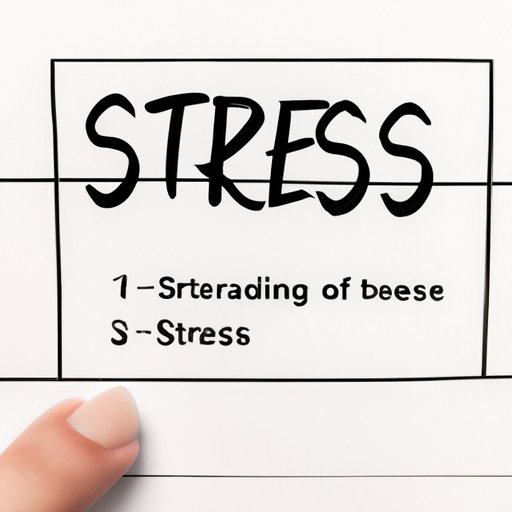
Introduction
Do you often find yourself scratching your skin when you are feeling stressed? You’re not alone. Stress-induced itching is a real phenomenon that affects numerous people. Itching caused by stress can be annoying, uncomfortable, and even lead to skin damage when done excessively. In this article, we will explore the causes of stress-induced itching and provide practical tips and techniques to help you avoid scratching that itchy skin.
Unveiling the Causes: Understanding the Link Between Stress and Itching
Stress and itching have a close link, and when one is present, it can trigger the other. At a scientific level, stress causes an increase in the production of the hormone cortisol, which can affect various parts of the body, including the skin. The skin has several nerve endings that can be triggered by cortisol, resulting in sensations of itching.
Some of the triggers for stress-induced itching include anxiety, depression, chronic stress, and post-traumatic stress disorder (PTSD). Also, certain medical conditions can also cause stress-induced itching. These conditions include nerve disorders, such as multiple sclerosis or shingles, liver diseases, and hormonal changes, such as menopause.
Find Your Calm: Simple Techniques for Reducing Stress and Soothing Itchy Skin
Fortunately, there are practical techniques you can use to reduce your stress levels and soothe your itchy skin. Some quick tips include:
Deep breathing
Taking deep breaths can help reduce stress in the moment and control the urge to itch. To do this, take a deep breath through your nose and hold it for a few seconds before exhaling through your mouth. Do this several times until you feel calmer.
Progressive muscle relaxation
Another technique to reduce stress levels is progressive muscle relaxation. This involves slowly tensing and relaxing your muscles; it can help release the built-up tension and promote overall relaxation.
Meditation
Regular meditation practice can significantly reduce stress levels and help you develop a more relaxed approach to life. You can try guided meditation or self-guided meditation by focusing on your breath or repeating a mantra.
Tips for Incorporating These Techniques into Daily Life
Making these techniques a regular part of your routine is essential to managing stress and avoiding itchy skin. You might consider setting aside 10 to 20 minutes each day to practice deep breathing, progressive muscle relaxation, or meditation. Also, try to notice when you feel stressed and incorporate these techniques throughout your day.
Treat the Source: Holistic Approaches to Combating Chronic Stress and Itch
While stress-reducing techniques are beneficial, they may not be enough for people who suffer from chronic stress. Holistic approaches can help you address the root causes of stress and reduce its impact on your skin. Here are some examples of holistic approaches to stress management:
Dietary changes
A well-balanced diet can provide support for your body to function correctly, thus reducing the impact of stress-induced itching. You should aim to include plenty of fruits, vegetables, lean proteins, and healthy fats in your diet.
Exercise
Regular physical activity can help release tension, reduce stress levels, and improve your overall mood. You don’t need to hit the gym—simple things like walking, yoga, or swimming can be beneficial.
Good Sleep
Stress and lack of sleep often go hand in hand. Therefore, getting adequate rest is essential to combat stress-induced itching. Try to stick to a regular bedtime routine and set up your sleeping environment to promote a good night’s sleep.
Mind Over Matter: How Cognitive Behavioral Therapy Can Help Reduce Stress and Itching
Cognitive Behavioral Therapy (CBT) is a form of talk therapy that can help people identify negative thoughts and behaviors and replace them with more positive ones. CBT can help break the cycle of stress and physical itching. Here are some of the techniques used in CBT for stress management:
Cognitive restructuring
This involves identifying and changing negative thought patterns. For example, if you’re always thinking about the worst-case scenario, you could work to change that mindset to something more positive.
Mindfulness meditation
This technique involves learning to be present in the moment and accepting thoughts and emotions without judgment. Regular practice can help reduce stress and promote relaxation.
Behavioral activation
This is a technique that involves identifying activities that bring enjoyment or pleasure and incorporating them into your daily routine. This approach can break the cycle of negativity associated with stress and promote overall well-being.
Shop Smart: The Best Products for Soothing Stressed-Out Skin
If you’re looking for products to help you soothe itchy skin caused by stress, several options are available. Here are a few things to look for when shopping:
Lotions
Look for fragrance-free lotions that contain ingredients to moisturize and soothe the skin, such as aloe vera, oatmeal, or chamomile.
Essential oils
Essential oils such as lavender, chamomile, and peppermint can promote relaxation and calm your senses. Mix a few drops of essential oil with a carrier oil like almond oil and apply it to the affected area.
Other topical treatments
Other treatments like hydrocortisone cream or calamine lotion can help reduce itching.
Conclusion
In conclusion, stress-induced itching can be uncomfortable and frustrating, but there are practical techniques and holistic approaches that can help you manage it. Reducing stress levels through deep breathing, progressive muscle relaxation, and meditation can provide immediate relief. Holistic approaches such as a well-balanced diet, regular exercise, and good sleep can help reduce chronic stress and prevent itching. CBT can help you break the cycle of stress and negativity and improve your overall well-being. Don’t be afraid to seek help from a medical professional if you need it. By taking a comprehensive approach to managing stress, you can avoid the discomfort of itchy skin and maintain a healthier, happier life.




